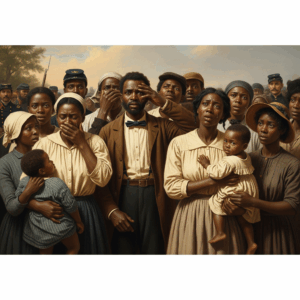When the news of freedom at last reached Texas—on June 19, 1865—over 250,000 enslaved Black people were told they were free. But that moment wasn’t simply joy: it was disbelief, relief, fear, grief, hope, and resolve intertwined.
Disbelief—after two long years beyond the Emancipation Proclamation—had likely left many thinking, “Is this real?” 
Relief—to be free from brutality and bondage was overwhelming. But that relief carried its own burden.
Grief—for separated families torn apart by sale, for lives forever altered. Frederick Douglass reflected that before freedom, many had “agonizing prayers of centuries.”
Fear—of retribution, homelessness, hunger, violence in a society that had for so long denied their humanity.
Hope—sparked the creation of new lives—”freedom colonies” where formerly enslaved people built communities and families.
Resolve—to claim citizenship, dignity, and a voice in a nation that had systematically silenced them.
Juneteenth reminds us all: Freedom arrived in fragments, but the courage and resilience carried forward the work of justice.
